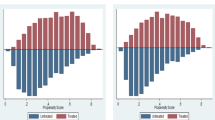Abstract
In this paper we calculate the rate of return to enterprise-related training (ERT) using a simultaneous equations self-selection model of investment in ERT and wages. For participants the expected rate of return to a year of ERT is approximately 28%. For non-participants the rate of return is negative. Although the average rate of return is high, the marginal rate of return is zero or negative. We further find that investments in ERT are not significantly determined by expected returns.
Similar content being viewed by others
References
Amemiya T (1985) Advanced Econometrics. Basil Blackwell Oxford
Barron JM, Black DA, Loewenstein MA (1989) Job matching and on-th-job training. Journal of Labor Economics 7:1–19
Becker G (1975) Human capital: A theoretical and empirical analysis with special reference to education, 2nd edition. National Bureau of Economic and Social Research New York
Bjorklund A, Moffitt R (1987) The estimation of wage gains and welfare gains in self-selection models. The Review of Economics and Statistics 69:43–49
Booth A (1991) Job-related formal training: Who receives it and what is it worth? Oxford Bulletin of Economics and Statistics 53:281–294
Brown J (1989) Why do wages increase with tenure? On-the job training and life cycle wage growth observed within firms. American Economic Review 79:971–991
Holzer H (1988) The determinants of employee productivity and earnings. NBER Working Paper 2782
Garen J (1984) The returns to schooling: A selectivity bias approach with a continuous choice variable. Econometrica 52:1199–1218
Groot W, Hartog J, Theeuwes J (1993) The vocational integration and re-integration of individuals into the labour market and their impact on structural change, productivity and growth. Report prepared for the 5th Conference of the European Ministers of Labour, Council of Europe
Hartog J (1989) Survey non-respons in relation to ability and family background: structure and effects on estimated earnings functions. Applied Economics 21:387–395
Hartog J, Pfann G (1985) Vervolgonderzoek noordbrabantse zesdeklassers. Department of Economics University of Amsterdam
Hashimoto M (1981) Firm-specific human capital as a shared investment. American Economic Review 71:475–482
Kenny LW, Lee L-F, Maddala GS, Trost RP (1979) Returns to college education: An investigation of self-selection bias based on the project talent data. International Economic Review 20:775–789
Lillard G, Tan H (1986) Private sector training. Rand Corporation R-3331
Lynch L (1992) Private sector training and its impact on the earnings of young worker. American Economic Review 82:299–312
Mincer J (1988) Job training, wage growth, and labor turnover. NBER Working Paper 2680
Mincer J (1989) Job training: Costs, returns, and wage profiles. Columbia University
Mincer J (1989) Human capital and the labor market: A review of current research. Educational Researcher 18:27–34
OECD (1991) Enterprise-related training. Employment Outlook 1991. OECD Paris 135–175
Oosterbeek (1991) Studeren: Hoe lang nog?. Economisch Statistische Berichten 922–923
Ritzen J, Stern D (1991) Market failure in training: New economic analysis and evidence on training of adult employees. Springer Verlag Berlin
Willis R, Rose S (1979) Education an self selection. Journal of Political Economy 87:S7-S36
Author information
Authors and Affiliations
Additional information
I like to thank two anonymous referees for helpful comments on a previous version of this paper.




